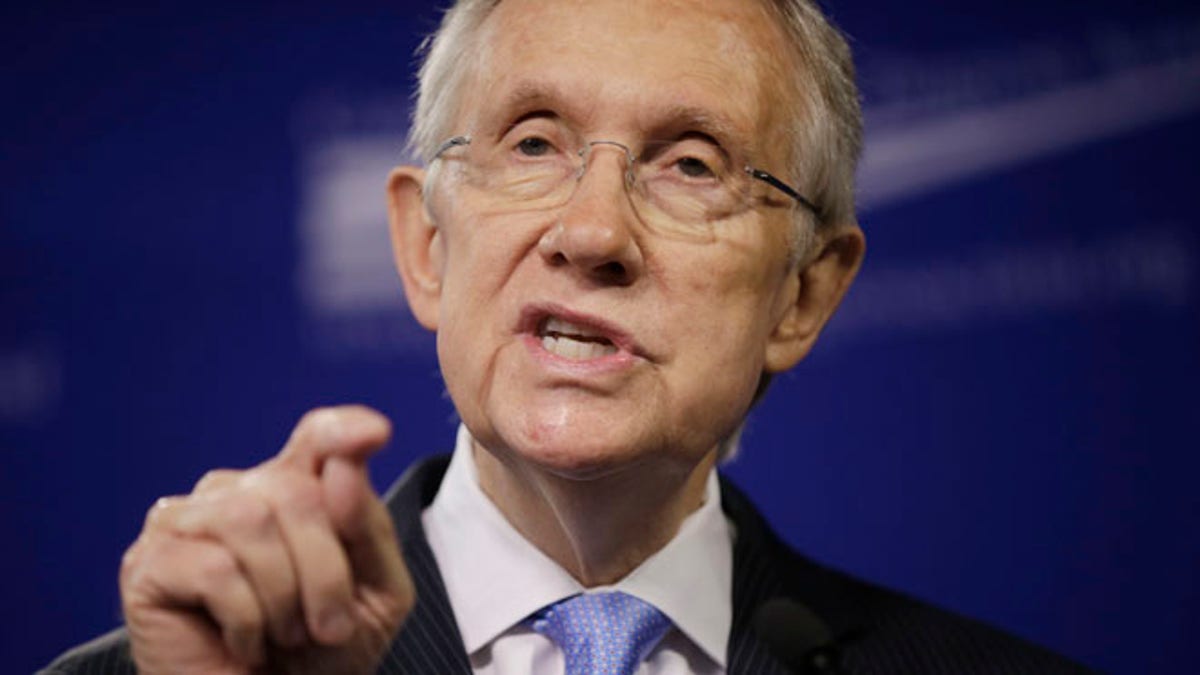
Senate Majority Leader Harry Reid speaks at the Center for American Progress Action Fund in Washington. (AP)
Senate Majority Leader Harry Reid issued an ultimatum to Republicans on Monday to confirm at least seven presidential appointees or face a controversial rule change that could drain their power.
A late night meeting attended by nearly every senator failed to produce an agreement to resolve the dispute.
After the hours-long session, Democratic Senate leaders reaffirmed that a key vote on the issue was scheduled for Tuesday morning.
Earlier Monday, Reid issued his ultimatum during a speech to the liberal-leaning Center for American Progress.
At issue is the Senate's own rulebook, which to lawmakers is a very serious topic. Reid is threatening to flout the normal process in order to change the rules so that key presidential nominees can be confirmed with just 51 votes -- as opposed to 60.In short, the move would curb the minority party's ability to filibuster nominees.
Despite virulent protests by Republicans, Reid called the move "a minor change, no big deal."
Republicans don't see it that way, and reminded Reid that he and other Democrats warned about doing such a thing when they were in the minority.
Senate Republican Leader Mitch McConnell of Kentucky said Reid's threatened action would "change the core of the Senate." He said it would fundamentally deny senators their right to question potential officials.
Republicans have delayed or blocked presidential nominees by using their filibuster powers, which allow 41 senators to block actions in the 100-member chamber.
Reid has teed up a test vote on several nominees for Tuesday, and now says that Republicans must confirm all seven to avoid a confrontation over what is dubbed the "nuclear option."
Among them are nominees to the National Labor Relations Board. Obama originally appointed them when he said the Senate was in recess -- but an appeals court ruled that Obama exceeded his authority, and Republicans likewise describe the appointments as illegitimate.
The roster also includes EPA Administrator nominee Gina McCarthy and Richard Cordray, nominee to lead the Consumer Financial Protection Bureau, which was created as part of Wall Street overhaul legislation that was opposed by the GOP. Many Republican senators say they will not confirm anyone to the consumer post unless the bureau's leadership structure is changed.
A GOP agreement to confirm the seven nominees would defuse the tension and allow the Senate to return to normal business, Reid said.
Senate Republicans and at least one Democrat, Sen. Carl Levin of Michigan, strongly oppose his proposed rules change.
All 100 senators were invited to the Monday night meeting in the Old Senate Chamber. Senators drifting in and out told reporters it was a "very good discussion" and the "most bipartisan discussion in a long time."
White House Chief of Staff Denis McDonough met with Reid's chief of staff ahead of the meeting.
Some senators, including Sen. John McCain, R-Ariz., and Sen. Bob Corker, R-Tenn., are floating possible compromises but there is no indication yet that Reid is ready to accept. It's also not clear whether Reid would have the votes to pursue the rule change.
"The power of an extreme minority" threatens the Senate's integrity, and forces him to act, Reid said Monday. He acknowledged that future Republican presidents were likely to benefit from the proposed rule change.
The proposed change would not end filibusters for legislation or judicial nominees. But some senators say a limited rule change now could open the gate for much deeper changes in the years ahead.
White House Press Secretary Jay Carney said Monday that Obama "supports Harry Reid and is appreciative of the support Harry Reid has given to his nominees."
Carney, asked if Obama worried that the Senate could become even more dysfunctional if rules are changed, said: "Well, it boggles the mind how they would achieve that."
The Associated Press contributed to this report.











































